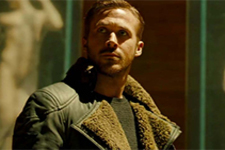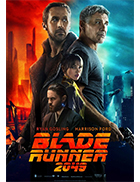Blade Runner 2049
|  Serious science fiction filmmaking has made a fascinating resurgence at the multiplex over the past few decades, arguably inaugurated by A.I. Artificial Intelligence (2001), Steven Spielberg’s great, confounding, emotionally rending posthumous collaboration with Stanley Kubrick. At least since the late 1970s, the science fiction landscape has been largely dominated by the commanding thunder of grandiose space operas and action movies like the resurrected Star Wars and Star Trek franchises, not to mention the clockwork releases of movies based on Marvel and DC’s stable of sci-fi/fantasy superheroes. However, in recent years that landscape has been dotted with an intriguing array of great and near-great films that genuinely explore, not just exploit, their sci-fi premises: philosophical explorations of artificial intelligence (2014’s Ex Machina), complex depictions of human relationships in a “post-human” world (2013’s Her), and incisive political fables (2006’s Children of Men, 2013’s Snowpiercer, 2009’s District 9). One of the very best of those recent films was Denis Villeneuve’s Arrival (2016), an elegant, absorbing depiction of how humanity might attempt to communicate with an alien species that is also a genuinely moving drama about how we are shaped by the choices we make. It was the first science fiction foray for Villeneuve, a French-Canadian transplant whose previous Hollywood films—Prisoners (2013) and Sicario (2015)—focused more on here-and-now depictions of crime and punishment and the moral gray zone between them. Science fiction seems to be a natural fit for him, which is fully confirmed by his latest film, Blade Runner 2049, the much belated sequel to Blade Runner (1982), Ridley Scott’s dark cinematic game-changer. Scott’s film has long been a cyberpunk and postmodern touchstone that is rightfully revered in many cinematic circles although it has always left me somewhat cold; it is easy to appreciate visually and intellectually, but never really delves beneath its cool, calculated surface. In this regard, Villeneuve’s sequel, which was written by Hampton Francher, who also co-wrote the original, and Michael Green (Logan), is a distinctly different—and superior—beast. The story takes place three decades after the events in Blade Runner, which was set entirely in a dystopian, industrialized, and highly polluted Los Angeles circa 2019. Things have not improved in the intervening years; in fact, they have only gotten worse, with the cityscape being even darker, more congested, and more alienating. We also get to see how it is flanked by arid desolation—blighted desert, rusting industrial wasteland, and, in the case of Las Vegas, an irradiated, uninhabitable ghost city whose constant orange glow suggests an unfathomable, multi-generational burn. It is in this bleak world that we are introduced to the protagonist, K (Ryan Gosling), a new-generation bioengineered replicant who, like Harrison’s Ford’s character in the original, is a Blade Runner, a cop whose job is to hunt and “retire” (that is, kill) rogue replicants. Unlike Ford’s character Rick Deckard (who plays an essential role in the film’s third act), there is no ambiguity as to K’s ontology, and knowing that he is a replicant early on shapes our understanding of his actions and gives them a complex pathos. Gosling plays K with a limited range of emotions; he’s not necessarily blank, but rather restricted, although as the film unfolds, he seems to gain more and more expressive humanity, which adds all manner of complication to the film’s underlying question of what constitutes humanity. Central to this development is his relationship with Joi (Ana de Armas), an artificial intelligence companion that takes the form of a holographic woman that at first is confined to K’s meager apartment, but is later able to travel with him via a handheld device. While advertisements outside K’s apartment make it clear that holographs like Joi are valued primarily for their sexual possibilities (even in 2049, women—both real and holographic—are objects to be consumed), K treats Joi with care and affection, to which she responds in kind. That line between the human and the artificial is immediately and constantly blurred, and for long stretches of the film it is all too easy to forget that its emotional core is built around the connection between a feat of bioengineering and a three-dimensional holograph. The plot is set in motion when K is sent to retire a rogue replicant named Sapper Morton (Dave Bautista) at his protein farm on the outskirts of Los Angeles, where K discovers the buried remains of a replicant that appears to have been pregnant (her burial at the foot of a long-dead, ash-white tree is one of the film’s more potent symbols of life and death). Since reproduction has never been a possibility for replicants, K’s superior, Lieutenant Joshi (Robin Wright), orders him to find the replicant’s offspring, kill it, and cover it all up. Tensions are already high between humans and replicants, with revolution simmering in the wings, and she wants to do everything she can to keep this discovery from becoming the match that lights an all-out war. Meanwhile, K is being tracked by Luv (Sylvia Hoeks), the replicant enforcer of Niander Wallace (Jared Leto), the bioengineer responsible for the newest generation of replicants. Wallace, who, like Tyrell in the first film, is part Frankenstein, part Darwin, and part Rockefeller, wants the replicants to reproduce because he sees in them infinite profit for servitude and labor in off-world colonies. K’s search for the replicant offspring eventually leads him to Deckard, who has been living in self-imposed exile for decades and holds the key to the film’s central mystery. Of course, any sequel to a film as iconic as Blade Runner is bound to have its challenges, even at the conceptual stage (how, after all, do you follow up a film that changed so much without looking redundant or exploitative?), and it is not surprising that it has taken the better part of 20 years and numerous false starts to get this one to the screen. Fancher and Green have wisely built their story from the original, rather than simply rehashing it; they supply just enough links to its iconic elements to draw goodwill without draining it. The screenplay expands on the ideas in the original and, in many ways, deepens them, partially by giving us characters who are more interesting and don’t hold us at arm’s length (I never really believed, for example, in the romance between Deckard and the replicant Rachael, although that relationship is essential to the action here). Gosling’s K is trained to obey, but his plight, especially when he becomes convinced that he is the replicant offspring he is hunting, embodies a sense of humanity that we can respond to. There were flashes of emotional resonance in the original film, but it was often smothered by the admittedly amazing visual presentation of its uniquely disquieting dystopian future. Those amazing visuals are present in 2049, as well; cinematographer Roger Deakins (who previously worked with Villeneuve on Prisoners and Sicario) creates a look that both draws from Jordan Cronenweth’s deeply influential lensing in the original while generating a distinct vibe all its own, partially due to the expanded settings and use of open landscapes. Blade Runner 2049 is the best kind of sequel in that it reminds us of what was worthwhile about its predecessor without being shackled to its achievements. It is its own. Copyright © 2017 James Kendrick Thoughts? E-mail James Kendrick All images copyright © Sony / Columbia Pictures / Warner Bros. |
Overall Rating: 


 (3.5)
(3.5)


